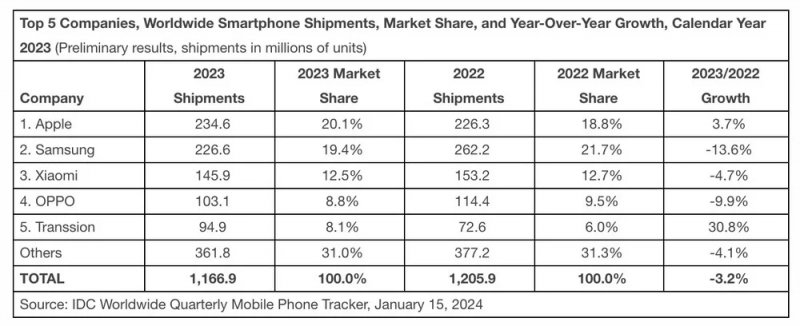Epochal milestone for Apple: 2023 marks the end of Samsung's ten-year dominance and brings positive feelings in view of the company's new steps.
2023 was a year that will be remembered around Cupertino.
Not only because the last twelve months have seen longevity disappear from Apple-branded phones lightning portbut especially following reports that Samsung has overtaken the top spot in global smartphone shipments.
According to preliminary data from the International Data Corporation (IDC), Apple has shipped 234.6 million of units over the course of the year, capturing 20.1 percent of the market.
In comparison, Samsung reached 226.6 million units, equivalent to 19.4 percent of the total share.
The Californian company becomes world leader in smartphone shipments for 2023, despite contracting device demand.
This success represents a goal sought for over 13 years.
The change in the lead is supported by a significant increase in shipments from Apple, which recorded an increase of 11.6% in the last quarter of 2023 compared to that of 2022.
Apple goes up, Samsung struggles
2023 marked a overall decrease by 3.2% in smartphone shipments, totaling 1.17 billion units.
During the year, Apple dominated various markets by shipping approximately 234.6 million units, recording growth of 3.7 percent from the previous year, when shipments stood at 226.3 million.
In contrast, Samsung recorded 226.6 million units shipped, down from 262.2 million in 2022, due to a global economic slowdown and a consumer preference for other products rather than upgrading to expensive or mid-range devices.
Xiaomi and Oppo they ranked third (145.9 million) and fourth (103.1 million), with shipment reductions of 4.7% and 9.9% in 2023, respectively.
Fifth position (94.9 million) was occupied by Transsion, which recorded 30.8% growth, shipping 94.9 million smartphones and capturing 8.1% market share.
A significant growth of 8.5% in total smartphone shipments was observed in the fourth quarter.
Apple was able to take advantage of the sprint of this period, shipping 80.5 million units, while Xiaomi recorded an annual increase of 22.7%.
Samsung showed signs of difficulty with a 10.9% contraction compared to the previous quarter, dropping to 16.3% market share.
This marks the first time Samsung has lost its lead since 2010, when Nokia was at the top and Apple wasn't even in the top five.
The redemption of the apple
Ryan Reith, vice president of the IDC Worldwide Mobility and Consumer Device Trackers group, highlighted that while Apple contributed to Samsung's decline, it was not the only player in the changing Android landscape.
The evolution followed the success of Huawei in China and the introduction of competitive devices on the market by brands such as OnePlus, Honor and Google.
The increase in popularity of foldable devices and the growing discussions onartificial intelligence in smartphones are helping to make the smartphone landscape extremely multifaceted.
Over the course of the year, Apple unveiled several unique improvements with the launch of the iPhone 15.
The 15 Pro and 15 Pro Max models have emerged as more appealing options thanks to their new SoC A17 Pro at 3nmthe titanium alloy finish, the improvements to the camera, which has been able to win several praises and, of course, the lens tetraprism telephoto lens exclusive to the Pro Max variant.
The company plans to extend the tetraprism camera upgrade to the iPhone 16 Pro and Pro Max as well, offering an additional option to consumers who will be able to get the same functionality at a lower cost than last year's exclusive.
However, Samsung has not stood by and, with the launch of its Galaxy S24 scheduled for tomorrow, it will be interesting to see how the Korean giant's flagship devices will give the new one a run for its money. leader Apple.
The year has just begun and, as usual, the performance of different smartphone manufacturers in the next quarter will be closely monitored.
#years #Apple #overtakes #Samsung #global #leader #smartphone #shipments

